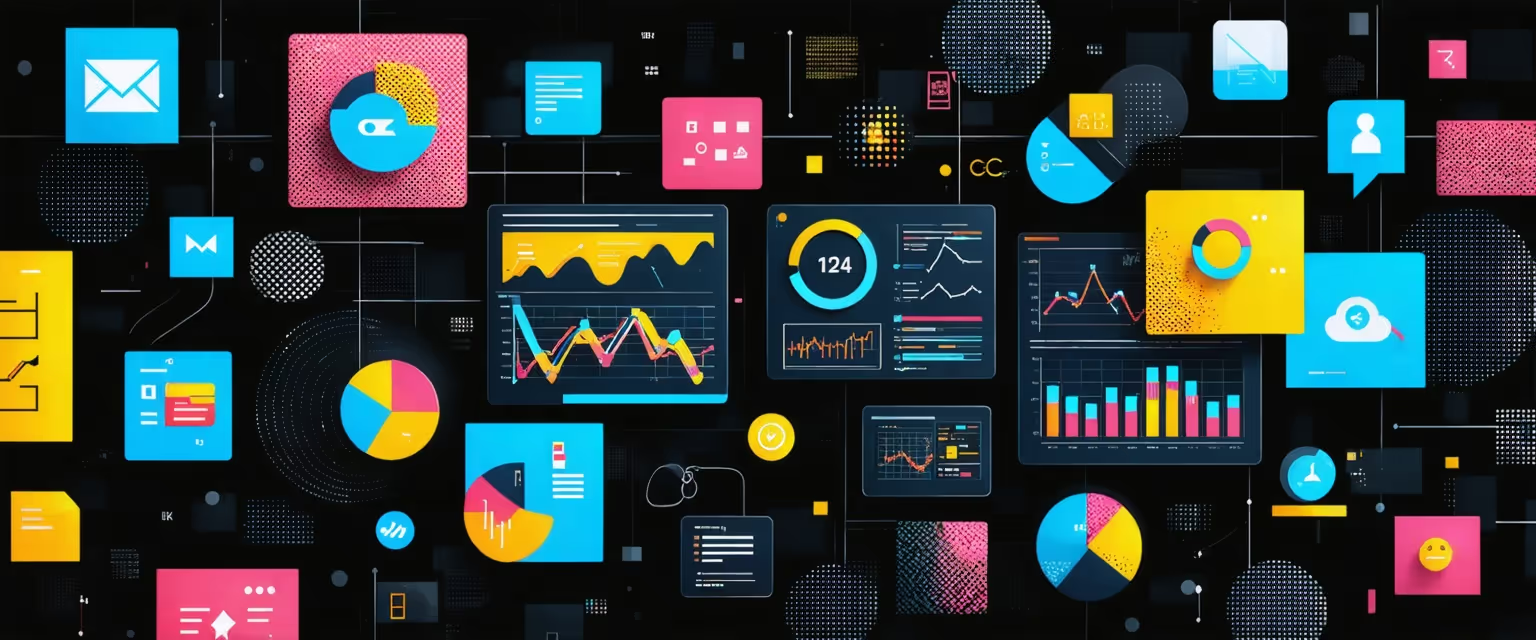Performance marketers waste countless hours assembling campaign insights from disconnected tools, struggling to piece together fragmented data. This fragmentation hinders data-driven decisions and obscures overall performance.
Thanks to advancements in Agentic AI, intelligent agents now gather, unify, and interpret campaign data in real time, eliminating manual effort and speeding up insight-driven decisions.
Datagrid's data connectors streamline this process, providing significantly faster, sharper insights to optimize strategies.
This article explains how AI agents automate campaign data aggregation for performance marketers.
Understanding Campaign Data Aggregation
Campaign data aggregation is a critical process for performance marketers, involving the collection, consolidation, and preprocessing of data from multiple marketing platforms and channels to create unified datasets for analysis.
Campaign data aggregation aims to bring together information from diverse sources such as social media, search engines, display advertising, email marketing, and partner platforms. This consolidated view allows marketers to gain a comprehensive understanding of campaign performance and customer behavior across all channels.
The ultimate goal of campaign data aggregation is to provide marketers with a holistic view of their marketing efforts. When done effectively, it enables more accurate measurement of ROI, facilitates data-driven decision-making, and allows for more sophisticated campaign optimization strategies.
The Role of Campaign Data Aggregation in Performance Marketing
Timely and accurate campaign data aggregation plays a crucial role in enabling performance marketers to measure ROI, optimize campaigns, and make data-driven decisions. As marketing campaigns grow more complex and data sources become more fragmented, manual aggregation processes simply can't keep up.
Referencing a comprehensive guide to AI agents can help marketers understand how to implement automation in their data aggregation processes.
Measuring ROI Accurately
By aggregating data from various sources, you get a comprehensive view of campaign performance across channels. This complete picture helps you attribute conversions correctly and understand which strategies truly drive returns.
Enabling Real-Time Optimization
In digital marketing, waiting days for manual data compilation means missed opportunities. Automated data aggregation enables real-time or near-real-time analysis, so you can quickly spot underperforming campaigns and adjust them for better results.
Facilitating Data-Driven Decision Making
When you bring data together from multiple channels, patterns emerge that you'd miss when looking at each channel alone. This comprehensive view helps you make smarter decisions about budget allocation, targeting strategies, and creative optimizations.
Utilizing marketing insights with AI further enhances your ability to make informed decisions.
Overcoming Fragmentation Challenges
Marketing data lives in many different systems that don't talk to each other. Manual aggregation of this fragmented data takes too much time and introduces errors. Automated solutions standardize data formats and create a single source of truth.
By optimizing data with AI, marketers can efficiently unify fragmented data sources.
Improving Data Quality and Consistency
One major challenge is dealing with inconsistent data formats, naming conventions, and metrics across platforms. Automated aggregation tools standardize this data, improving overall quality and making cross-channel performance comparison possible.
Scaling with Campaign Complexity
As your campaigns grow more complex, manual data aggregation becomes impossible. Automated solutions scale efficiently, handling massive data volumes from multiple sources without proportional increases in time or resources.
Implementing report scheduling automation ensures consistent delivery of insights without added manual effort.
By using advanced data aggregation techniques, you can overcome manual limitations and gain the insights needed to drive campaign success in today's competitive digital landscape.
Bottlenecks Slowing Down Campaign Data Aggregation
Performance marketers face significant challenges when manually aggregating campaign data, slowing down analysis and decision-making processes. These bottlenecks not only consume valuable time but also introduce complexity and potential errors into the workflow.
Accessing Multiple Platforms
The daily grind of switching between various advertising, social media, and analytics tools is exhausting. Each platform has its own unique interface and data export options, making consistent data collection tedious.
You might need to log into Google Ads, Facebook Business Manager, and your in-house CRM separately just to gather basic campaign data.
Handling Diverse Data Formats
Data from different platforms comes in various forms, such as CSV files, spreadsheets, and dashboard exports. This requires manual consolidation into a single usable format before you can even begin analysis.
Automating data integration can alleviate this burden by consolidating varied data formats efficiently.
Cleaning and Validating Data
Once collected, you face the tedious task of cleaning and validating data. Duplicates, missing values, and formatting errors require careful review and correction.
A consumer or a business can represent their name, address, or digital identifiers in almost an unlimited number of ways, necessitating meticulous data cleaning.
Generating Reports
After cleaning and validating data, you must organize it into comprehensive reports, summarizing key metrics and formatting results for stakeholders. This step often delays insight sharing, as it requires additional time to create visually appealing and informative reports.
Implementing marketing reports optimization can streamline this process and reduce delays.
These manual tasks significantly reduce the time you have for strategic work. Instead of focusing on campaign optimization and creative strategy, you find yourself bogged down in repetitive data management tasks.
How AI Agents Automate Campaign Data Aggregation
AI agents have transformed campaign data aggregation for performance marketers, streamlining processes and delivering actionable insights faster. By understanding different AI agent types, marketers can better leverage these intelligent systems to change marketing analytics.
API Integration and Automated Data Extraction
AI agents connect to multiple platforms via APIs, eliminating manual logins and downloads. They pull data directly from advertising, social media, and analytics platforms in real-time or on preset schedules.
This means you always have access to the most current information without tedious manual extraction.
AI-powered content aggregation agents collect and organize information from multiple sources, delivering concise summaries and insights you can apply immediately. This replaces traditional bottlenecks with AI-driven processes that scale as your needs grow.
Furthermore, AI agents assist in automating reports with AI, ensuring timely and accurate information is delivered to stakeholders.
Data Normalization and Standardization
Dealing with varied data formats from different platforms is a major challenge. AI agents standardize these diverse formats into a unified structure ready for analysis by:
- Harmonizing date formats
- Aligning metric definitions
- Standardizing naming conventions
This automation ensures you can make valid comparisons when analyzing cross-platform campaign performance.
Deduplication and Error Correction
AI agents detect duplicates and fix common data errors automatically, maintaining data integrity for accurate analysis. Advanced data aggregation rules allow AI systems to:
- Identify and merge duplicate entries
- Correct formatting inconsistencies
- Fill in missing data points based on context
This automated cleaning dramatically reduces data preparation time, letting you focus on strategic analysis.
Scalability and Handling Large Data Volumes
As campaigns grow more complex, the data volume can quickly overwhelm manual processing. AI agents manage increasing campaign data without extra work by:
- Processing millions of data points in seconds
- Adapting to growing data volumes without performance issues
- Providing real-time insights even as data complexity increases
This scalability lets marketing teams handle big data challenges without expanding their workforce or compromising analysis depth.
Adaptability to New Data Sources
The digital marketing landscape constantly evolves, with new platforms emerging regularly. AI agents adapt quickly to this dynamic environment. They can:
- Integrate new data sources into existing workflows
- Adjust to changes in API structures or data formats
- Learn and apply new data processing rules without extensive reprogramming
This flexibility keeps marketing teams agile and responsive to changes without disrupting data aggregation processes.
By using AI agents for campaign data aggregation, you can overcome the challenges of manual data processing. These intelligent systems save time, reduce errors, and provide deeper insights by processing data at a scale and speed humans simply can't match.
Datagrid for Marketing Professionals
As a performance marketer, you're likely juggling vast amounts of customer data, campaign analytics, and content across multiple platforms. Datagrid's AI-powered platform delivers specialized solutions to streamline your marketing operations and drive better results:
By integrating Salesforce and LinkedIn, Datagrid helps unify your data sources for more efficient marketing operations.
Customer Data Integration
Unify customer information from diverse sources, including CRMs, email platforms, social media, and website analytics, to create comprehensive customer profiles. This integration enables you to drive personalized marketing strategies based on a holistic view of your audience.
By connecting Salesforce and DocuSign, you facilitate seamless customer data integration for better engagement.
Integrations like connecting HubSpot and LinkedIn help unify your customer information from diverse sources, enabling comprehensive customer profiles.
Content Performance Analysis
Automatically process thousands of content pieces to extract engagement metrics, audience response patterns, and topic effectiveness. This capability helps you identify what truly resonates with your target audience, allowing you to refine your content strategy based on data-driven insights.
Competitive Intelligence Automation
Deploy AI agents to continuously monitor competitor websites, social channels, and marketing materials. These agents generate actionable insights about positioning, messaging, and campaign strategies, helping you stay ahead of the competition.
Through competitor tracking automation, you can gain valuable insights without manual effort.
Campaign Optimization
Analyze campaign performance data across channels to identify high-performing segments, messaging approaches, and conversion pathways without manual data processing. This automated assessment enables you to quickly refine your campaigns for maximum impact and return on investment.
Additionally, landing page monitoring with AI helps optimize conversion rates by providing real-time performance insights.
SEO Content Enhancement
Extract keywords, topic clusters, and semantic relationships from top-performing content in your industry. Datagrid's AI generates data-driven recommendations for content creation and optimization, helping improve your search rankings and attract more organic traffic.
By revolutionizing SEO with AI, you can stay ahead in search rankings and engage your audience effectively.
Marketing Asset Management
Organize and tag thousands of marketing assets based on content, campaign, performance, and audience relevance. This makes your creative library instantly searchable, improving efficiency and ensuring you always have the right assets at your fingertips.
Audience Sentiment Analysis
Process customer reviews, social comments, and survey responses to identify sentiment trends, brand perception shifts, and emerging customer needs requiring attention. This real-time analysis allows you to address issues quickly and capitalize on positive trends.
By facilitating connections like connecting Salesforce and Google Sheets, Datagrid streamlines your data management processes.
By implementing Datagrid in your marketing department, your creative and strategic professionals can focus on campaign innovation and customer engagement while AI handles the data-intensive analysis that traditionally consumes valuable creative resources.
Simplify Marketing Tasks with Datagrid's Agentic AI
Don't let data complexity slow down your team. Datagrid's AI-powered platform is designed specifically for teams who want to:
- Automate tedious data tasks
- Reduce manual processing time
- Gain actionable insights instantly
- Improve team productivity
See how Datagrid can help you increase process efficiency.













